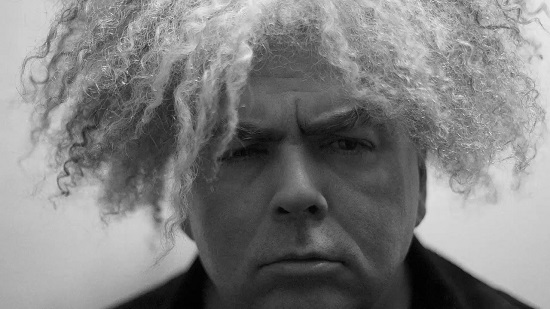If one of the litmus tests in music documentary is the quality of participants lining up to talk about the artist in question, this film about the Melvins passes with flying colours. The list of contributors on show in The Colossus Of Destiny: A Melvins Tale is formidable, featuring some of the most popular and innovative bands across the rock, metal and noise scenes since the late 1970s punk explosion. It risks hyperbole to suggest that the Melvins are one of the most important bands of the late 20th and early 21st century but witnessing members of Queens of the Stone Age, Boris (who took their name from a Melvins song), Sunn O))), Nirvana, Mastodon, Battles, Sleep, Dinosaur Jr., Black Flag, Off!, Circle Jerks, The Butthole Surfers, The Jesus Lizard, Dead Kennedys, L7, Soundgarden and Mudhoney, queueing up to pay their respects it’s hard not to come to that conclusion.
This lovingly made documentary focusing on Buzz Osborne and Dale Crover’s merry band of noisy innovators is as messy, belligerent, independent and inspiring as the band themselves. The film feels resolutely lo-fi, like the kind of indie doc that flourished in the 90s when digital technologies got cheap enough to really make filmic records like this possible, and captures the spirit of the band and where they came from beautifully. It’s a fantastic, if infuriating, marriage of form and content.
It’s messy in that during the first section of the film a mix of classic Melvins tracks battle it out with interview dialogue that has seemingly only been recorded on the camera microphones. It’s abrasive and forces the viewer to try and find a way to watch it. Attention must be paid. The film is also belligerent in that it’s an exhaustive oral history of the band comprising of mostly talking head interviews interspersed with some great archive footage and surreal and strange illustrated images and sections. It’s long too, ensuring that each era of the band’s lifespan gets its proper due. The film, largely funded through Kickstarter by the look of the credits, is squarely aimed at the fervently loyal Melvins fan base not only through content but also through its lack of engagement with the traditional formal expectations of the modern rock doc. It doesn’t care about those things, it cares about being passionate and direct and getting this important story on record.
To be turned off by these elements and this approach, which on the surface seem alienating and potentially only of interest to a hardcore few, is to miss the point. This independent, punk, two fingers up to established ways of doing things attitude is what the Melvins are all about and the film is clearly made by fans of the band who understand the value of artists who truly don’t care about what is expected of them. In this regard the film is refreshing. If you can get past the lack of sheen and slickness what emerges is a deeply personal and inspiring story that feels more resonant than ever in a music landscape that is often superficial and slavish to the idea of fame and fortune, even if those rewards are now the preserve of an even fewer number than ever before. What emerges through Bob Hannam’s film, and probably why so many illustrious and important artists wanted to contribute, is that the Melvins have not been forced into an independent way of doing things.
Save for their brief flirtation with a major label during their time at Atlantic Records, they have always done it their way and refused to play anyone’s game. It’s a nice surprise to have other musicians commenting on their time on a major label without calling them ‘sell outs’ or bemoaning why they got the shot. There’s genuine love for the band displayed and it’s helped by the fact that the band changed nothing about their approach while signed to Atlantic, instead turning out some of their heaviest and densest work ever. This of course led to them being shelved and starting over in the indie punk hinterland they know so well. What’s clear from listening to Buzz in particular throughout is that they know the consequences of their choice to approach their artistic journey the way that they have, have made peace with it and made a viable career out of staying true to themselves. It’s inspiring and the film showcases how to build an audience that grows with you, stays loyal and keeps the bills paid. Providing of course you want to live simply and simply find a way to make good work. The band clearly have a strong and close relationship with their fans and are hands on in everything they do that has the Melvins signature on it. Throughout the film it’s clear that Buzz and Dale accompanied the filmmakers during the interview process even when the participants aren’t addressing them off camera.
While you could never strictly accuse the Melvins of making punk music they perhaps typify the often-mythological punk ethos better than almost anyone you could imagine. They are pillars of integrity and while they may have had a Spinal Tap-esque litany of bass players, the end of the film sees old wounds healed, for the most part. Only a few former members are conspicuous by their absence. The Melvins have always followed their instincts, always done what they wanted and loved and carved out a unique sonic space in alternative rock music. They’re now the subject of a film that similarly refuses to compromise and do what’s expected and is all the more rewarding, poignant and appropriate for that.


